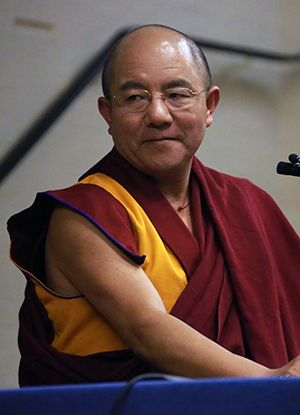Buddha’s Path in Practice: an End in Itself or a Means of a Better World?
Understanding the objective of the Buddhist path in practice is crucial. So, what is the meaning of attaining Buddhahood? Is it an end in itself or a means to a better world? Khenpo Sodargye discusses the above questions, and the prevalence of depression in the world and ways of treating it.
How Should We Look at Life?
Imbalance Between Development and Mental Health
No matter how rapid the advancement of human civilization is today compared with previous centuries, we human beings continue to suffer from more unbearable mental afflictions and agonies. These suffering will continue if we don’t apply an antidote to remedy them from within.
Our Responsibility to Help
Whether we are Buddhist monks or lay practitioners, or are people of other faiths, all of us should try our best to eliminate the physical and mental sufferings of humans and other beings. I believe this is an inescapable responsibility that we all must shoulder.
A Mantra for Curing Depression
The mantra of Acala (who is said to be an emanation of Buddha Akshobhya) has only ten syllables. Previously I did not teach it widely except to those who pleaded for help with their illnesses such as severe depression. I asked them to recite this mantra for about 10,000 times and a lot of them were cured afterward. It would be good if you could recite it for 10,000 to 100,000 times. Reciting it won’t do any harm even for non-Buddhists. Just like a medicine can cure diseases for people of all religious background, a powerful mantra can bring forth benefit to whoever recites it, irrespective of differences in faiths.
How Should We Look at Life?
Whatever we experience in life, be it happiness or sadness, do not become fixated on it. Life is inherently bittersweet. In Tibet, there is a saying, “When you reach the peak, there must be a downslope; behind happiness, there must be suffering”. Indeed, life is full of ups and downs, and twist and turns just like driving on unfamiliar terrains. For example, one day in the morning we may feel downcast, but in the afternoon we become cheerful, yet at night our moods shift again. All these are happening to us because we are subject to the law of dependent arising. Therefore, no matter what phenomenon appears to us, we all need to face it with bravery, to accept it and work hard on it. This is really important.
Cure for Depression
Nowadays, many psychologists and medical scientists in Eastern and Western countries are looking for the root cause of depression. However, I believe the cure for the mind’s illness is the mind itself. Unlike most human diseases that are caused by imbalances of the four elements; mental illness results from mental attitudes adopted by people themselves. For instance, some well-to-do people still find their days so meaningless that they contemplate ending their own lives. This kind of mental illness can only be cured by mental remedies addressing the mind, such as chanting mantras, practicing meditation, volunteering with an altruistic mind, and so forth. Thus, with proper mind training, patients will experience a lift in their spirits enabling them to overcome depression.

Imbalance Between Development and Mental Health
No matter how rapid the advancement of human civilization is today compared with previous centuries, we human beings continue to suffer from more unbearable mental afflictions and agonies. These suffering will continue if we don’t apply an antidote to remedy them from within.

Our Responsibility to Help
Whether we are Buddhist monks or lay practitioners, or are people of other faiths, all of us should try our best to eliminate the physical and mental sufferings of humans and other beings. I believe this is an inescapable responsibility that we all must shoulder.
“Just as some of the teachers here have said, the Buddhist teaching is the panacea for all the diseases in the world today.”
















